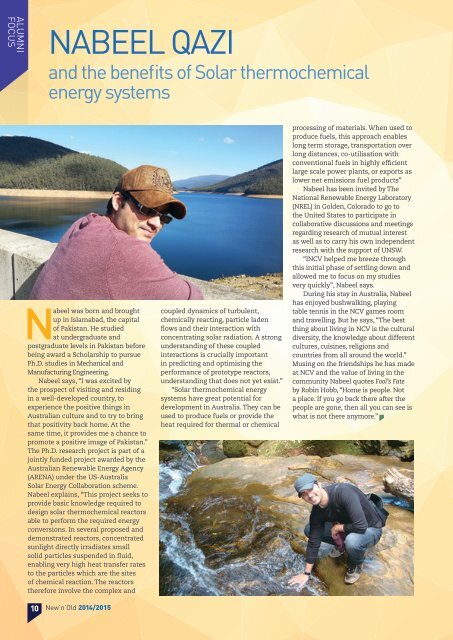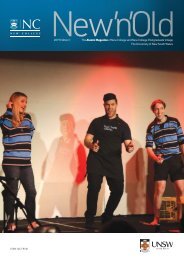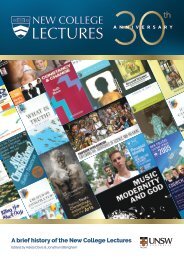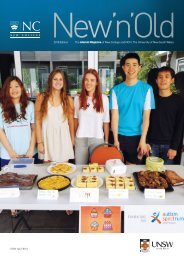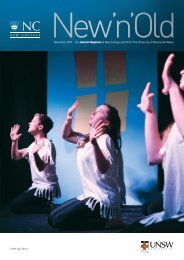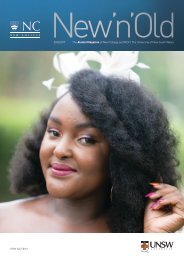New 'n' Old 2014/15
You also want an ePaper? Increase the reach of your titles
YUMPU automatically turns print PDFs into web optimized ePapers that Google loves.
XXXX<br />
ALUMNI<br />
FOCUS<br />
NABEEL QAZI<br />
and the benefits of Solar thermochemical<br />
energy systems<br />
Nabeel was born and brought<br />
up in Islamabad, the capital<br />
of Pakistan. He studied<br />
at undergraduate and<br />
postgraduate levels in Pakistan before<br />
being award a Scholarship to pursue<br />
Ph.D. studies in Mechanical and<br />
Manufacturing Engineering.<br />
Nabeel says, “I was excited by<br />
the prospect of visiting and residing<br />
in a well-developed country, to<br />
experience the positive things in<br />
Australian culture and to try to bring<br />
that positivity back home. At the<br />
same time, it provides me a chance to<br />
promote a positive image of Pakistan.”<br />
The Ph.D. research project is part of a<br />
jointly funded project awarded by the<br />
Australian Renewable Energy Agency<br />
(ARENA) under the US-Australia<br />
Solar Energy Collaboration scheme.<br />
Nabeel explains, “This project seeks to<br />
provide basic knowledge required to<br />
design solar thermochemical reactors<br />
able to perform the required energy<br />
conversions. In several proposed and<br />
demonstrated reactors, concentrated<br />
sunlight directly irradiates small<br />
solid particles suspended in fluid,<br />
enabling very high heat transfer rates<br />
to the particles which are the sites<br />
of chemical reaction. The reactors<br />
therefore involve the complex and<br />
coupled dynamics of turbulent,<br />
chemically reacting, particle laden<br />
flows and their interaction with<br />
concentrating solar radiation. A strong<br />
understanding of these coupled<br />
interactions is crucially important<br />
in predicting and optimising the<br />
performance of prototype reactors,<br />
understanding that does not yet exist.”<br />
“Solar thermochemical energy<br />
systems have great potential for<br />
development in Australia. They can be<br />
used to produce fuels or provide the<br />
heat required for thermal or chemical<br />
processing of materials. When used to<br />
produce fuels, this approach enables<br />
long term storage, transportation over<br />
long distances, co-utilisation with<br />
conventional fuels in highly efficient<br />
large scale power plants, or exports as<br />
lower net emissions fuel products”<br />
Nabeel has been invited by The<br />
National Renewable Energy Laboratory<br />
(NREL) in Golden, Colorado to go to<br />
the United States to participate in<br />
collaborative discussions and meetings<br />
regarding research of mutual interest<br />
as well as to carry his own independent<br />
research with the support of UNSW.<br />
“INCV helped me breeze through<br />
this initial phase of settling down and<br />
allowed me to focus on my studies<br />
very quickly”, Nabeel says.<br />
During his stay in Australia, Nabeel<br />
has enjoyed bushwalking, playing<br />
table tennis in the NCV games room<br />
and travelling. But he says, “The best<br />
thing about living in NCV is the cultural<br />
diversity, the knowledge about different<br />
cultures, cuisines, religions and<br />
countries from all around the world.”<br />
Musing on the friendships he has made<br />
at NCV and the value of living in the<br />
community Nabeel quotes Fool’s Fate<br />
by Robin Hobb, “Home is people. Not<br />
a place. If you go back there after the<br />
people are gone, then all you can see is<br />
what is not there anymore.”<br />
10<br />
<strong>New</strong>’n’<strong>Old</strong> <strong>2014</strong>/20<strong>15</strong>


